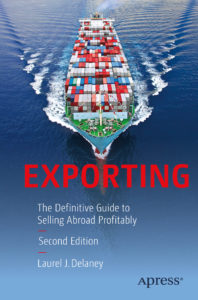Exporting Incentives
by Laurel J. Delaney
In celebration of a 20-year anniversary to writing my first exporting book, “Start & Run a Profitable Exporting Business,” I’ll be sharing excerpts from that book here over the coming months. This part still rings true from the standpoint of challenging why aren’t more companies exporting? Below I outline a few reasons. Read on …
Why aren’t more companies exporting? Is it because they’re short-sighted? Is it because they’re lazy? Is it because they lack incentives? Or is it because they don’t know how to start?
It is a fact that small businesses that export are more productive, report higher sales, employ more people, and pay higher wages than firms that do not export.
Imagine selling a shipment of scarves in Bali for U.S. $2 apiece that cost 25 cents apiece to manufacture in Taiwan — and all you needed to do was travel to Bali and make the sale. You’d do it, wouldn’t you?
If you received an inquiry from Japan requesting a price quote for one million IBM-compatible computer software disks, wouldn’t you respond?
If you were looking for an exciting, challenging and rewarding position as a “global marketing manager,” wouldn’t you want the knowledge to land the job?
These opportunities are out there, waiting to be seized. Some realistic incentives of going global include:
- Increasing your sales.
- Enhancing your image in the world marketplace.
- Generating economies of scale in production.
- Raising your profitability.
- Broadening your own intellectual horizons.
- Exploring previously untapped markets.
- Selling excess domestic capacity.
- Insulating seasonal domestic sales by finding new foreign markets.
- Outmaneuvering competitors.
- Improving your return on investments.
- Creating jobs.
- Enriching our country.
- Traveling to places you’ve never been before.
If these incentives aren’t enough, how about survival pure and simple? Business is about beating the competition, or keeping up at the very least, and these days you’ve got a lot more to worry about than the competing business on the other side of town. No matter what your product or service, you’ve got competitors all over the world, and more and more of them are managing worldwide operations. The best — maybe even the only — way to stay competitive with this new breed of global business managers is to become one yourself.
Furthermore, consider how your business helps fuel your country’s economic engine. If you and other business owners fail to keep pace with the changing world and globalize, that engine will run out of steam. Then where will you be?
©1998 and 2018 Laurel J. Delaney. All rights reserved.
For a look at Laurel’s most recent exporting book, visit here.
Photo credit: iStock/thitivong




 There are more than 8 billion potential customers in the world looking for your product or service. Are you ready to serve them?
There are more than 8 billion potential customers in the world looking for your product or service. Are you ready to serve them?